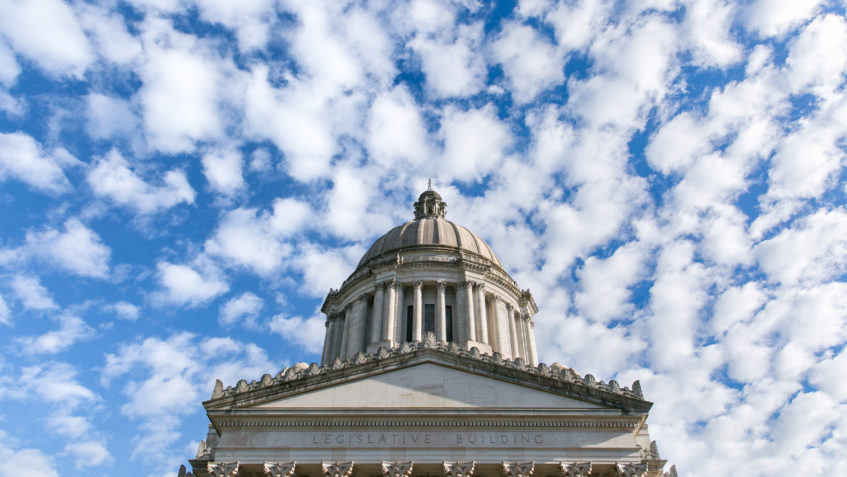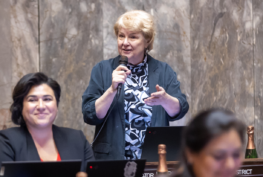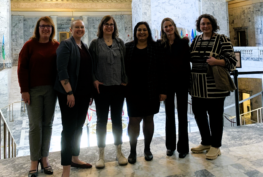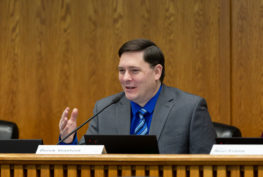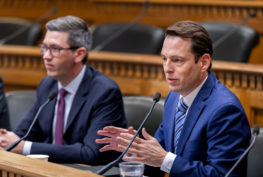OLYMPIA – Budget leaders in the Washington State Legislature announced an agreement today on a $69.3 billion, two-year budget to fund critical state services, including behavioral health, public schools, affordable housing, and a historic investment to address the climate crisis.
The two-year operating budget adds roughly $4.7 billion in new spending, leaves $3 billion in total reserves, and does not rely on any new general taxes or fees. It also maintains the services expanded using federal funds during the pandemic that protected vulnerable Washingtonians.
“Our new budget investments reflect the needs we see in communities across the state. People want strong schools, safe communities, affordable housing, climate action, and an innovative economy,” said Sen. Christine Rolfes (D-Bainbridge Island), chair of the Senate Ways & Means Committee. “This is a responsible spending plan that will improve lives and move our state forward.”
“This budget reflects the values of Democrats who have listened to the people of Washington and takes a holistic approach to meeting the needs of our communities. By lifting up those who have historically been excluded from access and opportunity, we have a resilient budget with investments that will put people first sustainably and responsibly,” said Rep. Timm Ormsby (D-Spokane).
The budget includes $2.9 billion in total new spending for K-12 education, the largest investment since the McCleary court decision. That includes continued rollout of the past biennium’s investments in nurses, counselors, and social workers in schools, lowering the financial burden on school districts. Special education will receive a significant new investment of $417 million. An additional $91 million will create more slots for children eligible for the Early Childhood Education and Assistance Program, continuing the Legislature’s commitment to expanding access to all qualifying families by 2027.
Roughly $1.2 billion ($603 million in new state money) in state and federal funds will go to respond to the state’s behavioral health challenges, addressing the Legislature’s Blake bill, SB 5536, adding new treatment facilities, more community-based housing, and new programs to support people with developmental disabilities and chronic mental illness. The budget also provides funding to boost treatment services for children and youth. Roughly $140 million from opioid settlement agreements will support treatment for substance use disorder.
The budget includes an additional $16 million to protect access to reproductive care and to support community clinics seeing sharp increases of out-of-state patients. Another $7 million was added to the current supplemental budget to meet immediate needs.
A total of $519 million will go toward housing and the immediate shelter needs of people experiencing homelessness across our state, including the state’s successful Right of Way Safety Initiative to transition unsheltered people to safer housing and services. Combined with investments from the proposed capital budget, new housing-related investments will exceed $1 billion.
Poverty reduction programs provide critical funding to keep people from harm. This budget funds those commitments, including $95 million for food assistance; $44 million for an eight percent increase to the Temporary Assistance for Needy Families program (TANF), the Aged, Blind, or Disabled program (ABD), and other cash assistance programs; $81 million for refugee support and education; and $19 million expanding TANF, including the diaper subsidy.
For the first time, the budget allocates funding from the Climate Commitment Act — more than $400 million — for projects to reduce carbon emissions and help prepare our communities for droughts, flooding, and other threats triggered by the climate crisis. Projects will focus on supporting overburdened communities, carbon sequestration, clean energy, energy efficiency in homes and buildings, and salmon recovery.
To improve public safety, the budget includes funding for enhanced reentry services for incarcerated individuals, new regional law enforcement training centers, and support for the state’s new agency focused on firearm violence prevention.
The budget also continues funding Washington’s new Working Families Tax Credit, which is currently accepting its first applications for up to $1,200 a year for low-income families.
The plan marks another milestone by eliminating the state’s unfunded pension liability for state retirement plans, saving the state billions of dollars over the next decade.
The budget is scheduled to receive floor votes in the House and Senate on Sunday, the final day of the 105-day legislative session.
2023-25 OPERATING BUDGET HIGHLIGHTS
(Numbers represent total new spending over two years.
In some cases, totals include federal or other supplementary funds.)
K-12 Education and Higher Education:
- $521 million for salary adjustment and healthcare cost increase for K-12 educators
- $417 million for special education students
- $85 million to expand access to free meals for students
- $91 million to expand Early Childhood Education and Assistance Program slots and increase rates
- $48 million to increase funding for health care workforce and training
- $90 million for low-interest graduate student loans
- $13 million to expand access to the Washington College Grant and dual credit programs
Targeted Equity Investments:
- $200 million for the Community Reinvestment Account
- $81 million for refugee support and education
- $49 million for community outreach and overburdened community-led environmental justice CCA projects
- $53 million to provide health care for undocumented adults (children are already covered)
- $88 million for equity initiatives across state agencies
- $25 million to fund Cascade Care for low-income people ineligible for Medicaid
Housing, Human Services, and Poverty Reduction
- $95 million in food assistance programs
- $44 million to fund an 8% increase to Temporary Assistance for Needy Families (TANF); Aged, Blind, or Disabled (ABD); and other cash assistance programs
- $35 million to increase support for foster care
- $140 million for emergency housing and rental assistance
- $150 million for the covenant homeownership program
- $60 million for encampment response and outreach
- $26 million for increased funding to the Housing and Essential Needs program
- $40 million to fund the Working Families Tax Credit
Public Health, Behavioral Health, Long-Term Care, and Developmental Disabilities:
- $76 million in foundational public health services
- $80 million to increase rates for health care workers, targeting primary care and pediatricians
- $24 million for reproductive health services and security measures
- $270 million for a rate increase for behavioral health providers
- $122 million for additional behavioral health bed capacity
- $142 million to expand substance use disorder prevention and treatment
- $21 million for behavioral health crisis, outreach, and diversion programs
- $28 million for youth behavioral health
- $80 million to increase homecare worker rates for individual providers
- $152 million for adult family home collective bargaining agreements
- $59 million for patient transitions out of acute care hospitals
- $108 million to meet Trueblood obligations to improve the state’s competency evaluation and restoration services
Increased rates for providers and workers, including:
- Nursing home rates — $107 million
- Assisted living rates — $56 million
- Supported living rates — $17 million
- Employment and community inclusion — $24 million
Climate Commitment Act and Natural Resources:
- $406 million in Climate Commitment Act investments
- $45 million for forest health and wildfire protection
- $39 million for biodiversity protection
- $36 million for salmon habitat and recovery
For more information:
Budget details are available at fiscal.wa.gov.

